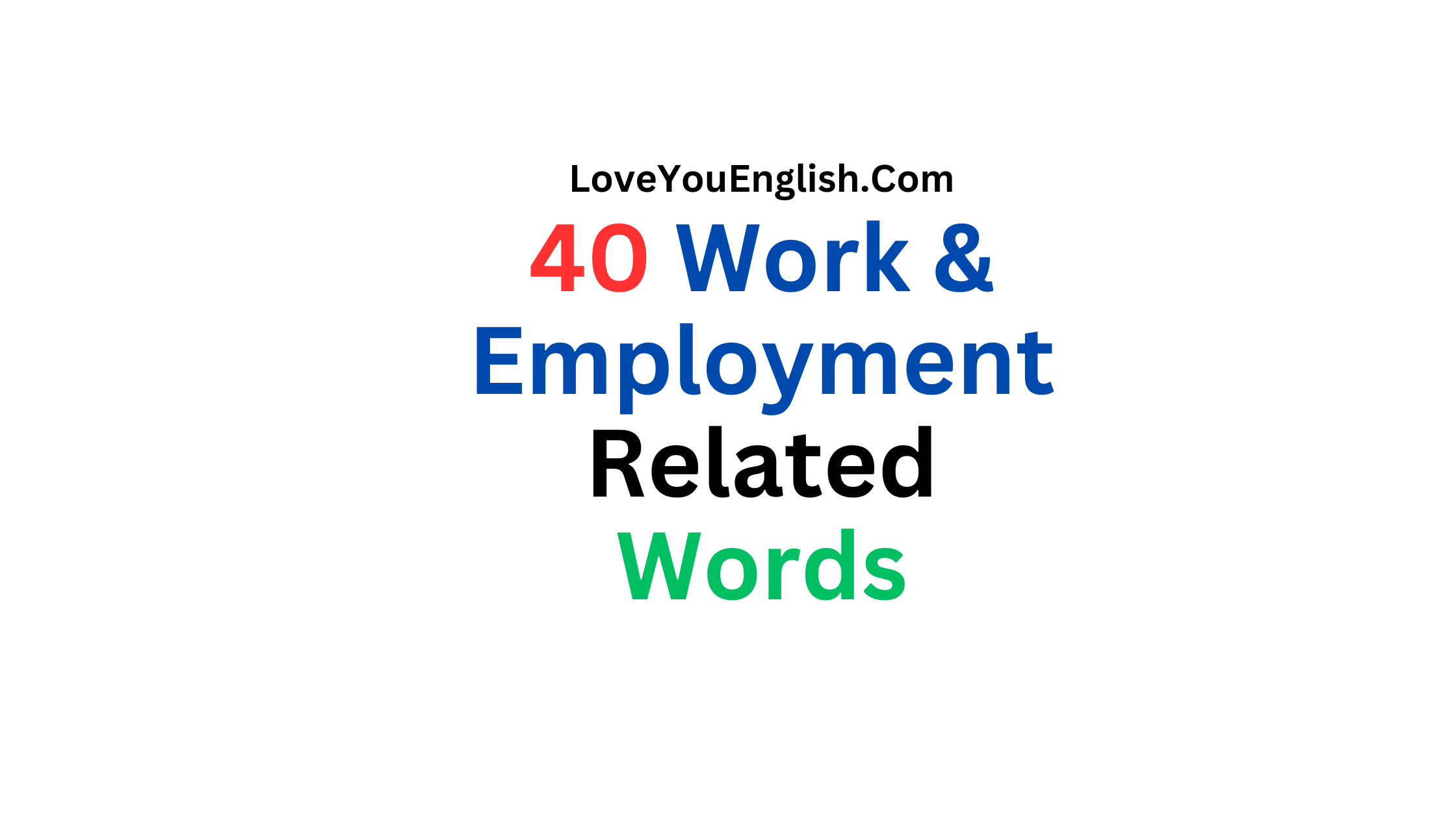40 Work and Employment-Related Words is a helpful guide for students, job seekers, and professionals who want to speak English confidently at the workplace.
In this post, you will learn common and useful work-related words that are often used in offices, job interviews, emails, and daily professional conversations.
Each word is explained in simple language, making it easy for English learners to understand and remember.
Whether you are preparing for a job, improving your business English, or building a strong professional vocabulary, this list will support your career and communication goals.
Table of Contents
ToggleExpand English Vocabulary: 40 Work and Employment-Related Words
1. Job
A specific role or position you hold at a company or organization.
2. Career
A long-term pursuit of a goal or profession, often with opportunities for advancement.
3. Resume
A document outlining your skills, experience, and qualifications for a job.
4. Interview
A meeting where you answer questions and discuss your suitability for a job.
5. Employer
A person or organization that hires people to work for them.
6. Employee
A person who works for an employer in exchange for compensation.
7. Salary
A fixed regular payment, typically made on a monthly or biweekly basis, for your work.
8. Wage
Payment based on the hours you work or the amount of work you do.
9. Promotion
Advancement to a higher position or rank within a company.
10. Hired
When someone offers you a job, you are officially “hired.”
11. Resignation
When you decide to leave your job voluntarily.
12. Contract
A formal agreement outlining the terms of employment between you and the employer.
13. Freelancer
A person who works independently, often for multiple clients, rather than being employed by one company.
14. Intern
A student or recent graduate undergoing supervised work experience.
15. Part-time
A job with fewer hours than a full-time position, often less than 30 hours a week.
16. Full-time
A job with a standard number of working hours, usually 35-40 hours per week.
17. Boss
The person who manages and oversees your work.
18. Colleague
A fellow worker or person you work with.
19. Supervisor
A person who oversees your work and provides guidance.
20. Team
A group of people working together towards a common goal.
21. Task
A specific job or duty that you need to complete.
22. Project
A larger, often complex, set of tasks with a goal and deadline.
23. Office
A place where people work, often with desks and computers.
24. Remote Work
Working from a location other than the company’s office, often from home.
25. Networking
Building relationships with other professionals to help with career growth.
26. Reference
A person who can vouch for your skills and character to a potential employer.
27. Benefits
Additional perks of a job, like health insurance or vacation time.
28. Probation
A trial period at the beginning of employment to see if you’re a good fit for the role.
29. Leave
Time off from work, which can be for vacation, illness, or personal reasons.
30. Salary Increase
An increase in your regular payment due to good performance or inflation.
31. Skills
Abilities or expertise that help you perform your job well.
32. Training
Instruction or education to help you improve or learn new job-related skills.
33. Workplace
The physical location or environment where you do your job.
34. Job Description
A detailed explanation of the duties, responsibilities, and expectations for a role.
35. Onboarding
The process of integrating a new employee into the company’s culture and procedures.
36. Performance Review
A formal evaluation of how well you are doing your job.
37. Applicant
A person who applies for a job.
38. Gig Economy
A labor market characterized by short-term, flexible jobs or freelance work.
39. Work-life Balance
The ability to manage work responsibilities and personal life effectively.
40. Work Ethic
The attitude and dedication you bring to your job, including reliability and commitment.
I hope you find these words useful for your work and employment conversations! 😊
Here are some effective ways to remember new words:
Use the word in context: Write sentences using the new word.
Visualize: Create a mental image associated with the word.
Mnemonics: Use memory tricks like acronyms or rhymes.
Repetition: Review the word regularly over time.
Group words: Organize related words together.
Word association: Link the new word to one you already know.
Write it down: The act of writing helps reinforce memory.
Teach others: Explaining the word to someone else solidifies your understanding.
Use flashcards: Test yourself regularly.
Learn word roots, prefixes, and suffixes: Understanding word parts can help you guess meanings.
Use the word in conversation: Practical application aids retention.
Create a story: Weave new words into a memorable narrative.
Conclusion
Building a strong vocabulary related to work and employment can greatly improve your confidence and communication in professional settings.
Whether you are preparing for a job interview, working in an office, or talking about your career goals, knowing the right words helps you express your ideas clearly and professionally.
By learning and practicing these 40 work- and employment-related words, you can better understand workplace conversations, write effective emails, and grow in your career.
Keep reviewing these words, use them in real-life situations, and continue expanding your vocabulary—because strong language skills open the door to better job opportunities and success at work.






